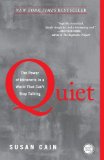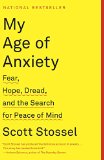Summary | Excerpt | Reading Guide | Discuss | Reviews | Beyond the book | Read-Alikes | Genres & Themes | Author Bio

The Power of Introverts in a World That Can't Stop Talking
by Susan CainAn extraordinary book with the power to permanently change how we see introverts and, equally important, how introverts see themselves.
At least one-third of the people we know are introverts. They are the ones who prefer listening to speaking, reading to partying; who invent and create but prefer not to pitch their own ideas; who favor working on their own over brainstorming in teams. Although they are often labeled "quiet," it is to introverts we owe many of the great contributions to society - from Van Gogh's sunflowers to the invention of the personal computer.
Passionately argued, impressively researched, and filled with the indelible stories of real people, Quiet shows how dramatically we undervalue introverts, and how much we lose in doing so. Susan Cain charts the rise of "the extrovert ideal" over the twentieth century and explores its far-reaching effects - how it helps to determine everything from how parishioners worship to who excels at Harvard Business School. And she draws on cutting-edge research on the biology and psychology of temperament to reveal how introverts can modulate their personalities according to circumstance, how to empower an introverted child, and how companies can harness the natural talents of introverts. This extraordinary book has the power to permanently change how we see introverts and, equally important, how they see themselves.
Now with a Reader's Guide and Bonus Content, including a recommended reading list of introverts in literature, and resources for readers with tips for introverts on public speaking, tips for parents of introverted children, and tips for educators.
Though her research is current and substantial, the basic tenets of introvert-versus-extrovert issues she explores are, for the most part, not revelatory. Rather, it is her big picture view and her unification of so many aspects of one maligned temperament that make the book an excellent read. Quiet is different from previous books on introversion because it explores the topic from so many perspectives. Other titles on this subject tend to be strictly in the self-help genre or straight memoir. Cain approaches introversion as a cultural anthropologist might, looking for all the ways it affects our society...continued
Full Review
 (498 words)
(498 words)
(Reviewed by Stacey Brownlie).
I wasn't surprised when Susan Cain's book, Quiet, mentioned that introverted people often thrive in the online world and are actually more likely to share personal information there than extroverts. I, for example, though unquestionably an introvert, enjoy reviewing books for BookBrowse, have profiles on several social networking sites, and have written a blog; these are all comfortable outlets for me to explore and express my interests.
Many introverts communicate via the Internet for this reason, relishing the chance to pursue their passions and find like-minded people in a way that is friendly to their temperament. Likewise, online communication has also made information and discussion about introverts and introversion more ...

If you liked Quiet, try these:

by Mary Costello
Published 2016
A vibrant, intimate, hypnotic portrait of one woman's life, from an important new writer.

by Scott Stossel
Published 2015
A riveting, revelatory, and moving account of the author's struggles with anxiety, and of the history of efforts by scientists, philosophers, and writers to understand the condition.